WEATHER STIMULATING PATHOGENS
Prevalence of turf diseases
by TurfPro Editor, Laurence Gale MSC, MBPR
There’s no doubt that this balmy, wet weather has influenced the incidence of some turf diseases to start their lifecycles. Also this week, I consider the restarting of sport and the importance of remote meetings.
Last week we finally received, in most parts of the country, some much needed rainfall that thankfully will have helped refresh many parched landscapes and sports facilities. It is surprising how quick grass recovers after a good dose of rain. Some midlands golf courses got anything between 9mm-45mm of rain in one single downpour!
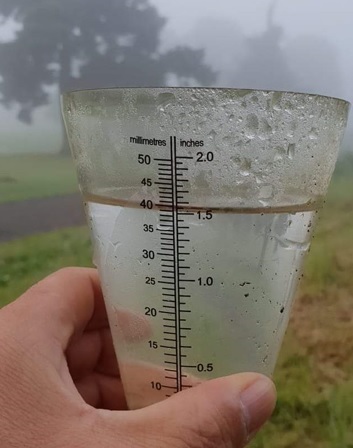
HG Mal Mitchell’s rain gauge shows 40mm of rain at Patshull Park Hotel Golf & Country Club
There’s no doubt that this balmy, wet weather has influenced the incidence of some turf diseases to become prevalent, stimulating these pathogens to start their lifecycles.
The pathogens that cause these diseases are always around and often lying dormant in the thatch layers waiting for the ideal conditions in order to become active. Once these spores are activated, and have found an acceptable host, they are able to grow and reproduce themselves, spreading new spores and infections to other areas of turf. This cycle continues whilst the right conditions prevail.
Spores are spread by wind, water and by traffic. It is during periods of fluctuating weather, particularly changes in temperatures, that an outbreak of disease takes place. Attacks of soil borne disease can appear at any time of the year. Foliar diseases prefer warm humid conditions of the spring and summer months hence we are now seeing a spike in turf grass disease.
Diseases can often be difficult to control. Most IPM strategies work very well and often involve the use of fungicide treatments to help suppress potential outbreaks of disease. As a general rule, fungicide applications should be made during the first signs of attack since disease can cause substantial damage in a short period of time. In recent years there has been a decline in the use of fungicides. Recent studies have shown that constant use of fungicides often sees the disease becoming resistant to them.
Today we have many strategies that can help prevent or reduce the incidence of turf diseases. In essence, if we have a good understanding of our soils, carry out good cultural practices and work with the weather, we can usually prevent a serious outbreak of disease. Recently we have seen groundsmen and greenkeepers making good use of weather forecasting apps to help them maintain their facilities.
Companies such as Headland Amenity and Syngenta have for many years provided an excellent weather service that helps us keep an eye on disease pressure activity with their forecasts. Mark Hunt at Headland Amenity only last week predicted a spike in diseases outbreaks. This spike really applied to Microdochium nivale but also to some of the other diseases that we see at this time including Red Thread and Fairy Rings. If ever there were diseases that like humidity and temperature, it is these three and if we were on the continent, it would be joined by Dollar Spot.
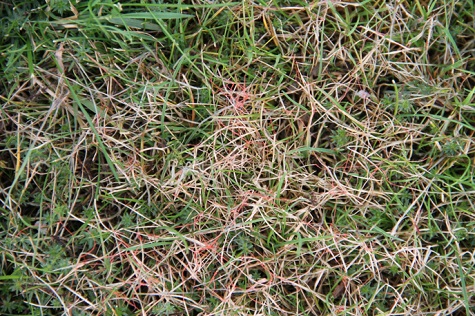
Red Thread (Laetisaria fuciformis)
SPORT RESTARTS
Groundsmen and greenkeepers up and down the country have been working hard to maintain and get their facilities ready for the start of some much eagerly awaited sport. Golf has had a great start with many clubs being inundated with players getting back out on the course. It has also been reported in some golf magazines that there has been an upsurge in membership enquiries at many golf clubs.
And there seems to be a lot of interest in the shorter game (nine holes) of golf, with several clubs stipulating that players can only play nine holes to help speed up the game.

Last Wednesday saw the resumption of the long awaited conclusion of the 2019/2020 Premier League football season. After a 100-day absence because of the coronavirus pandemic, Aston Villa v Sheffield United kicked off the English top-flight with a 0-0 draw. It was the first of 92 league games that will be packed into a frantic 40 days before the season concludes on 26 July.
It will be interesting to see how it all pans out and how they cope with the social distancing measures put in place.
I am sure many Premiership groundsmen will be happy to see the sport return and be able to get back to doing what they do best.
As for other sports, horse racing seems also to be enjoying its return with Ascot delivering a full five days of racing with Frankie Dettori, no doubt trying to steal the limelight in his usual way.
The ECB have announced their road map for the return of recreational cricket and a updated guidance for return to activity in a club setting.
As for bowls clubs, Bowls England like most sporting bodies have published guidelines and information for their members.
On the parks front, Paul Rabbits the Chair of the newly formed Parks Management Forum, has sent a letter to Boris Johnson and several leading MPs to promote the value of public parks and open spaces in an effort to gain future government funding for these vital assets that have shown their true value in society during Covid-19. A copy of this letter can be seen in today’s TurfPro’s Viewpoint feature article.

WEBINARS & VIRTUAL MEETINGS
This week, I also want to mention the recent popularity of the use of webinars and virtual meetings using Zoom and Microsoft Teams plus other systems, that have become the keyway to communicate especially why we are still in lockdown.
There is no getting away from it, these new ways of communicating are going to be a thing of the future and in the long-term help save a lot of time and money and resources. I have been using these new vehicles of communication in recent meetings I have been conducting with various companies, organisations and sporting governing bodies.

The Rugby Football Union will be hosting a series of support webinars so that volunteers can gain access to information that could help their clubs. I, along with Keith Kent, will be running one of these meetings with a number of Rugby Clubs on the 2nd July between 5-7pm with clubs able to book a half hour slot to talk to Keith and myself about relevant pitch maintenance questions.
The RFU will be running further Rugby Groundsmen Connect webinars that will provide tips, advice and guidance on groundsmanship for rugby clubs.
Other similar schemes are also being implemented. Cricket clubs across England and Wales can benefit from digital skills webinars as part of a new partnership between the ECB and Google Digital Garage.
ICL have recently completed a trilogy of online webinars which explored a broad range of invasive species and offered several innovative solutions.
Invasive plants are an increasing challenge for society, not least in the non-agricultural weed control (amenity) sector. Barry Browne ICL’s landscape and industrial national sales manager and keynote speaker Dr Dan Jones, managing director of advanced invasives, were on hand to provide expert advice throughout the webinars.
The first in the series focussed on Japanese Knotweed which is perhaps the best-known invasive plant species in the UK; this is in large part a consequence of invasive knotweeds possessing a range of biological properties that make them exceedingly difficult to manage.
The webinar explored how invasive knotweed biology and ecology creates a unique set of legislative, legal and management challenges and the solutions to which require evidence-based, pragmatic solutions.
You can read more about the webinar's here.
As they say, life goes on. We will always find new ways of working. Covid-19 for all its cruelty has without doubt changed the way we now need to live and work. For some aspects it may be for the better, caring more about one another and seeing the true value of our lives.
 |
|
 |  |
GARDENS INSTALLED AS THANK YOU TO NHS STAFF
At Newham Hospital
This week's WEB ONLY story focuses on the week-long project, managed by Ground Control, that involved the revamping of new courtyard gardens and revitalising outside spaces.
APF 2020 EXHIBITION POSTPONED
Rescheduled for September 2021
Due to the ongoing uncertainties surrounding Covid-19, the directors of APF 2020 have announced they have postponed the event for this year.
Due to the ongoing uncertainties surrounding Covid 19 the Directors of APF 2020 have announced that they have taken the difficult decision to postpone the event this year.
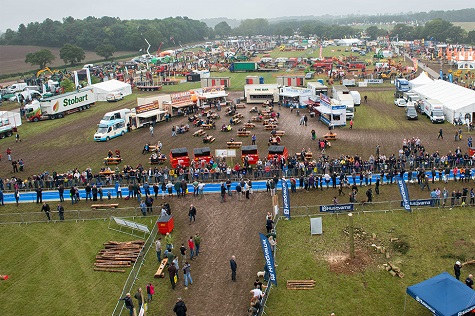
The revised plan is to roll forward the forestry machinery show which was due to take place at Ragley Estate from September 24-26 this year, to the same venue on 23/24/25th September 2021.
On their website the organisers listed all the reasons why they felt they must reschedule the event until next year. These included:
- The current ban on mass gatherings is still in place with no indication of if or when this restriction will be lifted.
- Recognising that exhibitors need to order stock and equipment for the show, much of which has a three month lead time and avoid the risk of exhibitors buying stock for the show which is then cancelled at short notice.
- The potential lack of availability of nearby hotel accommodation for APF staff.
- The proposed restrictions and quarantining of anyone visiting the UK will severely affect exhibitors, their staff and visitors from abroad being able to attend.
- Social distancing rules making it very hard for exhibitors to engage with visitors safely.
- Not to place an unnecessary potential strain on local emergency services by holding a mass gathering and recognising that currently police, ambulance and St John Ambulance are not attending any such events, with no indication of when they might do so.
Exhibition secretary, Ian Millward is quoted on the show's website, saying, "It is with a very heavy heart that we made this decision, but taking all of the above into account it became obvious that there was only one sensible option and that was to postpone until September 2021.
"The show is the industry flagship event and everyone in the organising team is passionate about the show and want to make it the best we possibly can. We simply cannot stage the event this year to the size and quality our exhibitors, sponsors, visitors and ourselves want. We sincerely hope that in 12 months time the world will have returned to something much closer to normal and we can run the event as we and everyone else want.
"Although the decision to postpone will impact financially, we remain in a robust financial position and exhibitors will not lose their site fees. We will roll these forward to APF 2021. Any visitors who have already bought advance tickets can either carry forward their tickets to APF 2021 or request a refund."
The show is a biannual event and after APF 2021 orgainsers say they will continue with this two-year cycle so the next event would be 2023 then 2025 etc.
 |  |
TRILOGY OF INVASIVE PLANTS WEBINARS COMPLETED
By ICL
Online events explored a broad range of invasive species and offered several solutions.
ICL have recently completed a trilogy of online webinars which explored a broad range of invasive species and offered several solutions.
Invasive plants are an increasing challenge for society, not least in the non-agricultural weed control (amenity) sector. Barry Browne ICL’s landscape and industrial national sales manager and keynote speaker Dr Dan Jones, managing director of Advanced Invasives, were on hand to provide expert advice throughout the webinars.
The first in the series focussed on Japanese Knotweed which is perhaps the best-known invasive plant species in the UK; this is in large part a consequence of invasive knotweeds possessing a range of biological properties that make them exceedingly difficult to manage.
The webinar explored how invasive knotweed biology and ecology creates a unique set of legislative, legal and management challenges and the solutions to which require evidence-based, pragmatic solutions.
By reviewing Advanced Invasives exclusive academic and commercial field trial research and publications, Dan provided practical, long-term, and sustainable recommendations for invasive knotweed management at all scales.
Himalayan Balsam and Giant Hogweed were the focus in the second edition of the invasive plant webinars. These species cause negative ecological and socioeconomic impacts and in the case of Giant Hogweed, it is also toxic to humans and livestock.
In this webinar Dan explored the biology and ecology of Himalayan Balsam and Giant Hogweed, highlighting how and why they have spread so successfully, but he also identified weak points that can be exploited for their effective management. Using Advanced Invasives exclusive commercial field trial research and unique case studies, delegates gained a better understanding of how these species can be practically applied to deliver effective long-term control and management, using less herbicide and labour.
In the final instalment of the series, Dan examined the woody invasive plants Buddleja (Butterfly Bush) and Rhododendron. He clarified how Butterfly Bush causes significant impacts in the built environment and revealed that Rhododendron is more problematic in upland conservation areas. Despite differences in the environments in which they are commonly found, Dan further explained that these species share a common growth strategy and remain popular ornamental species that are widely planted in the UK.
Ultimately this webinar examined how the evidence underpinning the management of these plants is presently incomplete, leading to the application of ineffective and/or costly management methods and herbicides, resulting in control programme failure. Reviewing the academic and industry literature in the context of Advanced Invasives exclusive research, Dan suggested how practical, long term, management of woody invasive weeds can be better achieved at all scales, at lower environmental and economic cost.
The large online audience across the three webinars consisted of a wide range of sectors which included horticulturists, landscapers, amenity grounds managers plus personnel from the infrastructure and construction sector.
“Seeing so many people attend these webinars was incredibly positive,” said Barry. “We had a range of really great questions from the attendees. The questions covered the ecology of the plants, some specific questions on how best to manage them and other queries regarding how other alternative methods work or do not work. It was good to engage with a wide audience of people that have such a diverse range of interests in invasive plants.
“I’d like to think that attendees would have come away from the webinars with a greater understanding of these invasive species and from a practitioners point of view they would have gained a greater insight into what products will work effectively, when they will work effectively and why they will work effectively. They will now be able to avoid using treatments that are not going to work.”
Recordings of the full webinars along with the question and answer sessions have been recorded and are available to view:
 |  |
SALTEX ENCOURAGED BY INDUSTRY REACTION
Praise for GMA's decision to reschedule
The GMA has said it is "highly encouraging" to see the support they have received from the industry regarding their decision to postpone 2020's event.
The GMA has said it is "highly encouraging" to see the support they have received from the industry regarding their decision to postpone 2020's SALTEX.

Speaking on behalf of the GMA Board, Geoff Webb, CEO at the GMA commented, “We would like to thank our exhibitors, visitors, partners and suppliers for their support and patience during this challenging time.
"It has been highly encouraging to see the industry come together and support the GMA’s decision.
“We feel we have acted quickly, working hard to secure these new Spring dates, in order to deliver the event the industry deserves.”
The GMA says their announcement has been well received by exhibitors and those working in the industry who have praised the timing of the decision.
David Cole, managing director of Reesink Turfcare, said, "We are pleased to see the GMA take decisive steps to deal with the growing doubt and anxiety about SALTEX going ahead in November. It would have been a difficult decision for a variety of reasons, but for us the right one to remove uncertainty and replace it with a forward date that we can look forward to with optimism. Early March keeps us in the ‘pre-season’ window to be able to give focus to the exhibition before the pressures of the season takeover."
David’s views were echoed by Caroline Shaw, European marketing manager for Trimax Mowers. Caroline said, “The decision to postpone the largest show of the year couldn’t have been easy but the decisive action, coupled with the determination to put the health and well-being of our industry professionals first, is something we are proud to support.”
Tom Shinkins, operations manager at GKB Machines, believes that the new dates could be advantageous, saying, “I believe the new dates will actually be more beneficial because we’ll be able to arrange demonstrations with prospective new customers straight after the show.
“With the show previously in November, we would meet lots of visitors on our stand but quite often we would not be able to carry out demonstrations for them until the new year due to the unpredictable weather. Now we will have the whole of Spring to visit SALTEX customers.”
Industry professional end users also had postive things to say about the move. Neil Stubley, head of courts and horticulture at the All English Lawn and Tennis Club, Wimbledon, said, "It’s a sensible decision which allows everyone to concentrate on the here and now and then focus for 2021."
Karl McDermott, head groundsman at Lord’s, said, “Sad news but the right decision. I always see SALTEX as a great way to finish off the cricket season but now it is going to be a nice warmup for next season. I’m looking forward to March 2021.”
SALTEX will now take place on 3 and 4 March 2021 at the NEC, Birmingham.
 |  |
NEW BOWLS CONTRACT DELIVERED
By Richard Peel Groundcare
When company won a new contract to maintain five bowling greens in the Manchester area, an Infinicut mower with UltraGroomer cassette was invested in.
Richard Peel Groundcare have taken delivery of an Infinicut FX pedestrian mower, complete with an UltraGroomer cassette from the TMSystem range, to help deliver on a brand-new bowls maintenance contract.
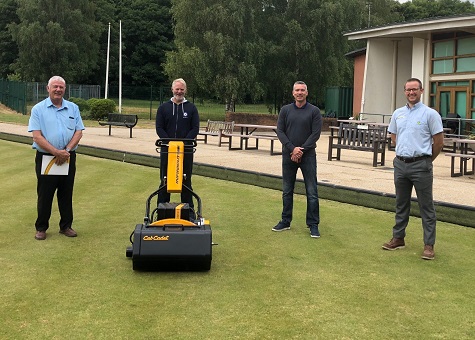
Undertaking pitch maintenance and renovations for football clubs at all levels, owner Richard Peel said, “We’d had always been impressed with the Infinicut when we had seen it at industry trade shows and it was clear from posts on social media that it was going to tick a lot of boxes for us.”
After a successful demonstration, Richard took delivery of his new mower in June 2020, from local dealer Balmers GM. “From an environmental point of view, the battery is major plus - not just as a cleaner source of energy, but the reduction in noise and vibration issues for the operator. HAV is a massive industry-wide issue, causing long-lasting damage to those using machinery on a daily basis. It’s something I’m really passionate about reducing with every piece of equipment I buy.”
One operative on Richard’s team takes care of the eight greens they now maintain, each cut twice a week. “I’ve received nothing but positive feedback, particularly how lightweight the unit is, how easy it is to set-up, adjust and control and the fantastic cut quality.
"We also purchased the UltraGroomer cassette which we will use on the greens once a month, to keep on top of any lateral growth and thatch accumulations. This should mean we won’t then have to conduct more invasive removal operations come the end of the season.”
Delighted with his purchase, Richard concludes, “This combination of equipment now puts us in the best position to keep the greens healthy, playing well and looking at their best throughout the year.”
 |  |
GGM STEP OUT FOR CHARITY
Walking and cycling for local community
Unable to complete a planned charity event due to the restrictions, The GGM Group has come up with a novel way to raise funds for Greenfingers, St John’s Hospice and Pendleside Hospice.
Staff from the Colne-based GGM Group were disappointed that due to current restrictions in the lake district, they are unable to complete the company’s annual charity walking event, which this year was to climb the three highest peaks in England.
Determined not to be defeated, managing director Chris Gibson has come up with his own ingenious way of completing the challenge.
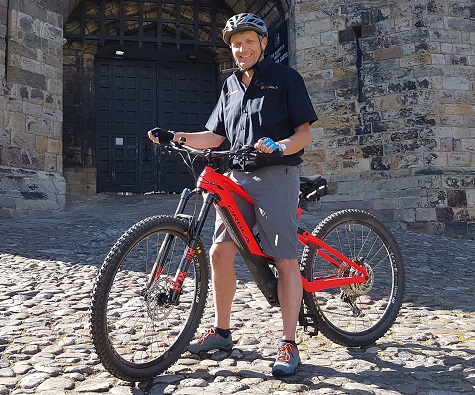
Chris Gibson
Chris has pledged to travel from his home town of Lancaster to the businesses’ head office in Colne and then back again covering a distance of approximately 100 miles - through a combination of cycling and walking. The walking element will cover the Lancashire Witches Walk which passing through the Forest of Pendle, the town of Clitheroe and the Forest of Bowland to finish at Lancaster Castle.
Chris said, “Last year the GGM team completed the Yorkshire Three Peaks in aid of our company charity, Greenfingers, and we were looking forward to this year’s event.
“As part of the Government’s initiative to get us back to work via walking or cycling, I thought this was the perfect opportunity to continue our fundraising. I’ve decided to create my own version, which adheres to government guidelines and so I will be cycling to work from Lancaster and then walk home over the Lancashire Witches Walk.
"I’ve chosen this route because it was created to mark the 400th anniversary of the trail of the 'Lancashire Witches' held at Lancaster Castle and I wanted to recognise the injustice and prejudice of the past and the need continue to fight to remove these from society today. Our team will be participating in our efforts, with people undertaking different legs in pairs, to enable social distancing."
The event will raise money for charities who are finding themselves cash-strapped during these difficult times. Greenfingers is the company charity for the second year running, dedicated to supporting children who spend time in hospices around the UK, along with their families, by creating inspiring gardens for them to relax in. In addition, funds will also be raised for St John’s Hospice in Lancaster which provides free palliative care to patients with life shortening conditions across North Lancashire, South Lakes and parts of North Yorkshire and Pendleside Hospice in Burnley, which exists to promote and enhance quality of life for people with life-limiting illnesses.
Chris concluded, “It’s a key part of our ethos at The GGM Group to give something back to the local community so for this event we’ve decided to support both St John’s Hospice in Lancaster and Pendleside Hospice in Burnley, as local charities who are desperately in need of funds at this time alongside Greenfingers our nominated company charity.
“As we all adapt to the “new normal”, becoming more environmentally aware is a key part our business strategy and we are currently working with East Lancashire Chamber of Commerce undertaking ISO14001 accreditation - the small things like staff walking or cycling to walk all make a difference."
The GGM Group has set a target of £1000 for the event. You can support this worthy cause by donating here.
 |  |
GREEN CREDENTIALS PRAISED
Housing provider invests in battery equipment
Orbit has purchased a large fleet of Pellenc equipment, from dealer RT Machinery, to meet its low noise and carbon emissions requirements.
Orbit, one of the UK’s leading housing providers, has invested in a large fleet of battery powered Pellenc equipment, from dealer RT Machinery, to meet its low noise and carbon emissions requirements.
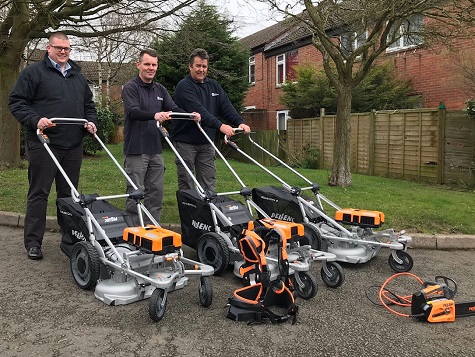
Orbit is one of the largest housing groups in the country with a growing property portfolio of over 45,000 homes spanning the Midlands, east and south. The company says green objectives are at the forefront of its agenda; from construction to day to day operational management of its properties, efficient use of resources is a key consideration.
Through its Orbit Earth initiative, the company say they aim to take responsibility for its impact on the environment, take action to reduce this impact and embed more sustainable practices throughout the business.
Rhys Warwick, an estates team manager for Orbit, was asked to investigate the procurement of new machinery to complement its Orbit Earth initiative. He started researching battery powered groundscare equipment which would be able to withstand the heavy demands of commercial use.
“I was looking specifically at commercially viable equipment rather than domestic tools and found that actually the market was very limited,” he said. “We looked at a lot of manufacturers and the equipment was extremely limited in terms of the running times and the warranty we’d like from commercial equipment.
“Fortunately, we came across Pellenc at SALTEX 2019 and were really impressed at the design, the running times and pretty much everything about that equipment. It was probably one of the only brands we had seen that was really and truly commercially viable with the running times you would need to have a good full day’s work in grounds maintenance.”
After seeing the equipment at SALTEX, a demonstration day was organised, and Orbit ordered a fleet consisting of Rasion Easy mowers, City Cut brushcutters, Excelion strimmers, Selion chainsaws, Arion blowers and the powerful ULiB 1500 batteries. Over a three-year period, the equipment will continue to be incorporated into Orbit’s operations - as Rhys explains.
“I would say that in three years’ time, 95% of our groundscare equipment will be electric, and all of that will be exclusively Pellenc.
“Our operatives have been extremely impressed with the running time of the 1500 battery. They have commented on being able to get round several sites, sometimes not needing a charge for two days. The batteries also hold their charge between use as well.”
“Ultimately, Pellenc equipment has the commercial bite needed to meet our environmental aspirations.”
The complete range of Pellenc equipment purchase by Orbit was supplied by official dealer RT Machinery and area sales manager Scott Reynolds.
 |
|
 |  |
ADVERTISE YOUR JOBS HERE
Amazing success rates!
Advertise your recruitment needs on TurfPro Weekly Briefing and reach our targeted audience of recipients every week.
Contact Nikki Harrison for details - 01491 837117
|
 |  |
 |  |
 |  |
 |  |
 |  |
WHY PARKS MATTER?
A statement from the Parks Management Forum to the Prime Minister
by Paul Rabbitts, MLA FRSA, Chair- The Parks Management Forum
Read chair of the newly formed Parks Management Forum, Paul Rabbits' letter to Boris Johnson, asking for his support for the sector.
Dear Prime Minister, Ministers and Members of Parliament,
Why Parks Matter? The Statement from The Parks Management Forum
The Parks Management Forum represents individuals and organisations working in the public parks and open spaces sector, whether in the public, private or third sector.
Today we write to you to ask for your support and to bring a greater appreciation of the value of parks and open spaces and the vital role they play for our communities, and in particular how they can play a key role in the recovery after the Covid-19 pandemic.

In March 2020, the lives of our communities were affected like no other time in recent history with the global impact of Covid-19. People were encouraged to use their local parks as they became the only area of respite from the tough restrictions imposed by the lockdown. Now as the gradual relaxing of restrictions are taking place, the use of parks and open spaces continues to be encouraged as places to meet people safely, take exercise and maintain our health and well-being.
The evidence indicating the value of parks and green spaces is overwhelming. The Parks Management Forum is now urging all MPs, Local Authorities and Government Departments to support the following recommendations:
- Ring-fence appropriate funding to protect, enhance and sustain parks and green infrastructure services for future generations;
- Acknowledge the success of local authorities and all other relevant organisations in managing public parks and open spaces during the COVID19 lockdown and the widespread public affection for them;
- Recognise the important role parks and open spaces had during the pandemic and will have in the ongoing recovery process, with likely greater usage, and in the health and well-being, socio-economic and environmental agendas and allocate emergency funding to support this role;
- Support nature recovery plans as part of the Environment Bill; and
- Encourage all local authorities to adopt a Green Infrastructure or Green Spaces Strategy, underpinning the value of parks and open spaces for public health, regeneration and well-being, social equity, biodiversity and climate change resilience.
Creating a Sustainable Green future (the evidence)
New mobility data shows that Britons are flocking to parks to socialise and exercise. There has been a 136% increase in the amount of people gathering in parks when compared to a baseline figure prior to lockdown, according to Google’s mobility data. The Government’s daily briefing on 30 May 2020 also referred to this trend. There are 27,000 parks and open spaces nationwide and they can all play a part in the recovery after the height of the pandemic. This increase is almost certainly likely to bring continued greater usage.
The Government Public Parks Inquiry in 2017 emphasised that the future of public parks was at a tipping point. The State of UK Public Parks reports (2014 and 2016) gave the clearest picture of the sector for some time. They reported that maintenance budgets were still being reduced, capital was less available for improvements and park facilities were becoming more expensive to manage.

Today, the parks and open space sector could face an even greater challenge with further austerity as a distinct possibility and a deep recession looming. Now with a recognised, and in many instances, rediscovered important key role in society, there are incredible opportunities to embrace the important role our parks and open spaces have during the recovery phase. The Fields in Trust publication ‘Revaluing Parks and Green Spaces - Measuring their economic and wellbeing value to individuals’ is a great baseline on how parks and open spaces can contribute not only to health and well-being, reducing health inequality but also to the financial recovery.
This research was conducted in line with HM Treasury best practice for valuing non-market goods, using two valuation methodologies: Contingent Valuation (stated preference to elicit an individual’s Willingness to Pay) and Wellbeing Valuation (subjective wellbeing assigning equivalent monetary values to life satisfaction survey responses); and additional analysis to quantify partial health cost savings to the Exchequer.
The key findings:
- Parks and green spaces are estimated to save the NHS around £111 million per year based solely on a reduction in GP visits ( we do not account additional savings to the NHS associated with reductions in prescribing or referrals);
- An individual would need to be compensated by £974 a year to replace the life satisfaction they would have gained from using their local park or green space (more than once per month); and
- Aggregated across the UK an estimated £34.2 billion worth of wellbeing benefits per year are delivered by frequent use of parks and green spaces.
As a group, we are engaging with practitioners and the whole sector to ensure that parks and open spaces meet the 21st century challenges around health, climate change and nature recovery. In particular, we are keen to collaborate with the wide range of organisations working for similar aims and help government meet their own policy challenges at scale. As John Ruskin was quoted, "The measure of any great civilization is in its cities, and the measure of a city's greatness is to be found in the quality of its public spaces, its parks and squares".
We are passionate about the importance of our parks and green spaces. COVID-19 has highlighted what we already knew - how valued parks and local green spaces are by our communities. It is time to start reinvesting in this green infrastructure to secure it for future generations and your support is paramount in helping us to do this.
We hope that you will support our recommendations and work with us to reposition the importance of parks and open spaces as valued community assets and that deserves a better recognition and protection moving forward.
Thanking you in anticipation.
Yours sincerely
Paul Rabbitts MLA FRSA
Chair- The Parks Management Forum
Email: chair@parksmanagementforum.co.uk
Website:www.parksmanagementforum.co.uk
Twitter: @park_forum; LinkedIn: The Parks Management Forum
Tel: 07915602358
 |
|
|
|